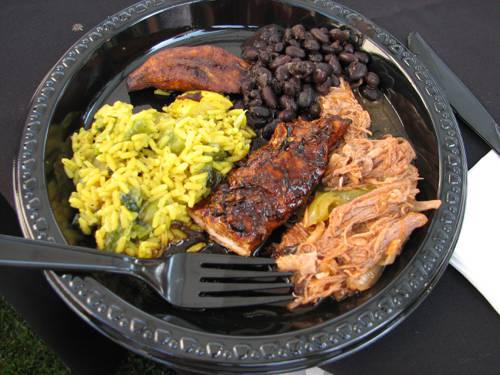
FAQ About The Influence of Caribbean Cuisine on Global Gastronomy

What are some key ingredients used in Caribbean cuisine?
Caribbean cuisine is known for its rich flavors and unique combinations of ingredients. Some key ingredients include:
- Spices: Allspice, nutmeg, and cinnamon are commonly used to add depth and warmth to dishes.
- Produce: Fruits such as mango, papaya, and plantains; root vegetables like yams and cassava.
- Proteins: Seafood, chicken, and goat are popular, often seasoned with herbs and spices.
- Others: Rice, beans, and coconut milk are staples that provide versatility and flavor.

How has Caribbean cuisine influenced global food trends?
Caribbean cuisine has significantly influenced global food trends by introducing bold flavors and unique cooking techniques. Popular Caribbean spices and seasonings, such as jerk seasoning, have become staples in kitchens worldwide, offering a taste of the islands to various dishes. Additionally, the diverse cooking styles, such as grilling and slow-cooking, have inspired chefs globally to incorporate these techniques in their menus.

What are some popular Caribbean dishes that have gained international popularity?
Several Caribbean dishes have crossed international borders and gained popularity worldwide, including:
- Jerk Chicken: Known for its fiery seasoning blend, jerk chicken is a staple in many countries.
- Curry Goat: This spiced dish is enjoyed in various parts of the world, bringing Caribbean warmth to different cultures.
- Callaloo: A leafy green dish similar to spinach stew, callaloo has made its way into global cuisines.
These dishes not only highlight the flavors of the Caribbean but also showcase the region’s diverse culinary heritage.

What is the historical influence of the Caribbean on global gastronomy?
The Caribbean has a rich culinary history that reflects a melting pot of cultures, including African, European, and Indigenous influences. This mix has contributed significantly to global gastronomy by introducing unique flavors and dishes. The transatlantic slave trade and colonial periods played pivotal roles in this blend, as they brought different peoples and their culinary traditions together, leading to the distinctive Caribbean cuisine known today. These influences have been woven into various global culinary practices and recipes, enriching international gastronomy.

How do Caribbean cooking techniques differ from those of other regions?
Caribbean cooking techniques are distinctive for their use of vibrant spices and the practice of marinating meats thoroughly before cooking, known as 'jerking.' This method involves wrapping the food in leaves or cooking it slowly over an open flame or on wood, allowing the spices to penetrate deeply. Additionally, Caribbean cooking often features braising and stewing methods that yield rich and complex flavors, setting it apart from some other regional cuisines that may favor more subtle flavor profiles.

What are some common misconceptions about Caribbean cuisine?
One common misconception is that Caribbean cuisine is predominantly spicy and overwhelming in flavor. While it's true that many dishes are rich in spices, they are often balanced with sweet or mild ingredients, creating a harmonious taste. Additionally, Caribbean cuisine is sometimes mistakenly thought to be monolithic, when in reality, it encompasses a diverse range of culinary styles and traditions, each unique to different islands and influenced by various historical factors.

How have Caribbean culinary traditions influenced other regional cuisines?
Caribbean culinary traditions have enriched other regional cuisines by introducing new ingredients and cooking techniques. For example, the use of allspice and scotch bonnet peppers has been incorporated into Latin American and Southern U.S. dishes. The Caribbean's emphasis on fresh, flavorful ingredients has also inspired chefs globally to experiment with tropical fruits and tubers, thereby broadening their culinary repertoires and encouraging fusion cuisine.

What role do tropical fruits play in Caribbean cuisine?
Tropical fruits like mango, papaya, and coconut are cornerstones of Caribbean cuisine. They are used in a variety of ways, from fresh in salads, to cooked in stews, and blended into juices and desserts. The natural sweetness and vibrant flavors of these fruits are often used to balance the spiciness of dishes, providing a refreshing complement to the savory main ingredients. Their versatility makes them a key ingredient in many traditional recipes.

Are there any global restaurants known for specializing in Caribbean cuisine?
Yes, many global restaurants specialize in Caribbean cuisine, bringing the diverse flavors of the islands to international diners. Chains like Golden Krust in the United States offer traditional Caribbean dishes such as patties and oxtail stew. Additionally, high-end restaurants and small eateries alike in major cities worldwide offer menus inspired by Caribbean flavors, often incorporating authentic ingredients and cooking styles.

How does the Caribbean culinary fusion manifest in global food culture?
Caribbean culinary fusion manifests in global food culture through the blending of traditional Caribbean flavors with other international cuisines. This can be seen in dishes like Caribbean tacos, where jerk chicken is served with tortillas, or in Caribbean-infused sushi rolls featuring tropical fruits and spices. The fusion not only showcases Caribbean ingredients but also introduces them to new audiences, continually evolving the way they are perceived and enjoyed globally.

What is the nutritional profile of traditional Caribbean dishes?
Traditional Caribbean dishes tend to have a vibrant nutritional profile, often incorporating a balance of proteins, vegetables, and carbohydrates. Dishes like rice and peas, and callaloo are rich in fiber and vitamins due to the use of whole grains and leafy greens. Seafood and lean meats provide essential protein, while the generous use of fruits and vegetables ensures a hearty intake of vitamins and antioxidants. However, it's worth noting that some dishes can be high in sodium and fats, depending on preparation methods.

How are Caribbean spices used in universal culinary practices?
Caribbean spices like allspice, thyme, and scotch bonnet peppers have found their way into universal culinary practices through their inclusion in spice blends and sauces used globally. Jerk seasoning, for instance, has transcended its origins to become a popular marinade and rub for a variety of meats and vegetables. The balanced yet vibrant flavor profile of Caribbean spices makes them a versatile addition to many different types of dishes, elevating their taste and appeal.

What aspects make Caribbean cuisine unique among other world cuisines?
Caribbean cuisine is unique due to its bold use of spices and diverse influences from various cultures such as African, Indigenous, and European. This creates a distinct blend of flavors not commonly found in other world cuisines. The region's abundant use of tropical fruits, fresh seafood, and root vegetables, paired with innovative cooking techniques like grilling and stewing, further sets it apart. The emphasis on festivities and communal cooking also highlights the cultural importance of food in Caribbean societies.

Can Caribbean cuisine be adapted for vegetarian or vegan diets?
Yes, Caribbean cuisine can be easily adapted for vegetarian or vegan diets. Many traditional dishes are naturally plant-based, such as rice and peas, callaloo, and roti filled with vegetables. Meat-based recipes can often be modified by substituting legumes, tofu, or various vegetables while retaining the original spices and seasonings that define Caribbean flavor. This adaptability ensures that vegetarians and vegans can enjoy the rich culinary heritage of the Caribbean without compromising on taste.

What cultural influences have shaped Caribbean culinary practices?
Caribbean culinary practices have been shaped by a confluence of cultural influences, primarily from Africa, Indigenous peoples, Europe, India, and Asia. The transatlantic slave trade brought African elements such as okra and yams, while European colonization introduced new cooking styles and ingredients. Indian indentured laborers contributed spices and curry dishes, and Chinese immigrants added elements like fried rice. These diverse influences have combined to create a dynamic and multifaceted culinary tradition.

How do Caribbean food festivals contribute to its global popularity?
Caribbean food festivals play a significant role in promoting its global popularity by showcasing the region's rich culinary diversity to international audiences. Events like the Jamaica Food & Drink Festival and the Barbados Food and Rum Festival attract chefs, food enthusiasts, and tourists from around the world, offering a platform for Caribbean chefs to demonstrate their skills and innovate traditional recipes. These festivals celebrate the region's vibrant food culture and invite a wider appreciation of its culinary excellence.

What is the significance of coconut in Caribbean cooking?
Coconut is a significant ingredient in Caribbean cooking, known for its versatility and ability to impart flavor and richness. It is used in a variety of forms—coconut milk, oil, and grated flesh—and features in both savory and sweet dishes. Coconut milk, for example, is widely used in curries and stews, providing a creamy texture and subtle sweetness, while shredded coconut is common in desserts like coconut bread and pastries.

What are some challenges in globalizing Caribbean cuisine?
Globalizing Caribbean cuisine faces challenges such as maintaining the authenticity of flavors while adapting to local tastes and ingredient availability. Many traditional ingredients may be hard to source, leading to substitutions that could alter the flavor profile. Additionally, educating international audiences about the diversity and complexity of Caribbean cuisine beyond the stereotypical dishes can be challenging. Overcoming these hurdles requires thoughtful adaptation and a focus on preserving the essence of traditional recipes.

Are there any famous Caribbean chefs who have impacted global culinary scenes?
Yes, several famous Caribbean chefs have made significant impacts on global culinary scenes. For instance, Jamaican-born chef Levi Roots has popularized Caribbean flavors in the UK with his Reggae Reggae Sauce, turning a traditional family recipe into a commercial success. Additionally, Trinidadian chef Peter Edey has worked to modernize and promote Bajan cuisine through high-profile international events. Their influence has helped to elevate Caribbean cuisine in the international gastronomy arena.

How can someone incorporate Caribbean flavors into their home cooking?
Incorporating Caribbean flavors into home cooking can be easily achieved by using spices and ingredients native to the region. Key spices like allspice, cumin, and coriander can be used to season meats and vegetables, providing a taste of the islands. Additionally, experimenting with tropical fruits, such as mangoes and pineapples, in savory dishes or desserts can introduce the unique balance of sweet and spicy flavors typical in Caribbean cuisine. Simple adaptations like using coconut milk in soups and stews also imbue dishes with a Caribbean flair.
